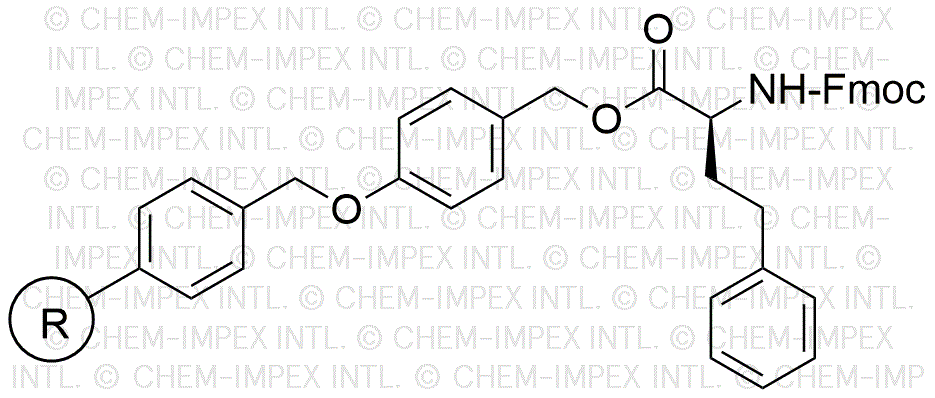Fmoc-L-homophenylalanine 4-alkoxybenzyl alcohol resin is widely utilized in research focused on:
- Peptide Synthesis: This resin is essential for solid-phase peptide synthesis, allowing researchers to create complex peptides efficiently and with high purity.
- Drug Development: It aids in the design of peptide-based drugs, particularly in the pharmaceutical industry, where tailored peptides can lead to novel therapeutic agents.
- Bioconjugation: The resin can be used to attach peptides to other biomolecules, facilitating the development of targeted drug delivery systems and diagnostics.
- Research in Neuroscience: Its application in synthesizing neuropeptides helps in studying neurological pathways and potential treatments for neurological disorders.
- Custom Peptide Libraries: Researchers can utilize this resin to create diverse peptide libraries for screening and identifying new biological activities, enhancing drug discovery efforts.
General Information
Properties
Safety and Regulations
Applications
Fmoc-L-homophenylalanine 4-alkoxybenzyl alcohol resin is widely utilized in research focused on:
- Peptide Synthesis: This resin is essential for solid-phase peptide synthesis, allowing researchers to create complex peptides efficiently and with high purity.
- Drug Development: It aids in the design of peptide-based drugs, particularly in the pharmaceutical industry, where tailored peptides can lead to novel therapeutic agents.
- Bioconjugation: The resin can be used to attach peptides to other biomolecules, facilitating the development of targeted drug delivery systems and diagnostics.
- Research in Neuroscience: Its application in synthesizing neuropeptides helps in studying neurological pathways and potential treatments for neurological disorders.
- Custom Peptide Libraries: Researchers can utilize this resin to create diverse peptide libraries for screening and identifying new biological activities, enhancing drug discovery efforts.
Documents
Safety Data Sheets (SDS)
The SDS provides comprehensive safety information on handling, storage, and disposal of the product.
Product Specification (PS)
The PS provides a comprehensive breakdown of the product’s properties, including chemical composition, physical state, purity, and storage requirements. It also details acceptable quality ranges and the product's intended applications.
Certificates of Analysis (COA)
Search for Certificates of Analysis (COA) by entering the products Lot Number. Lot and Batch Numbers can be found on a product’s label following the words ‘Lot’ or ‘Batch’.
*Catalog Number
*Lot Number
Certificates Of Origin (COO)
This COO confirms the country where the product was manufactured, and also details the materials and components used in it and whether it is derived from natural, synthetic, or other specific sources. This certificate may be required for customs, trade, and regulatory compliance.
*Catalog Number
*Lot Number
Safety Data Sheets (SDS)
The SDS provides comprehensive safety information on handling, storage, and disposal of the product.
DownloadProduct Specification (PS)
The PS provides a comprehensive breakdown of the product’s properties, including chemical composition, physical state, purity, and storage requirements. It also details acceptable quality ranges and the product's intended applications.
DownloadCertificates of Analysis (COA)
Search for Certificates of Analysis (COA) by entering the products Lot Number. Lot and Batch Numbers can be found on a product’s label following the words ‘Lot’ or ‘Batch’.
*Catalog Number
*Lot Number
Certificates Of Origin (COO)
This COO confirms the country where the product was manufactured, and also details the materials and components used in it and whether it is derived from natural, synthetic, or other specific sources. This certificate may be required for customs, trade, and regulatory compliance.

